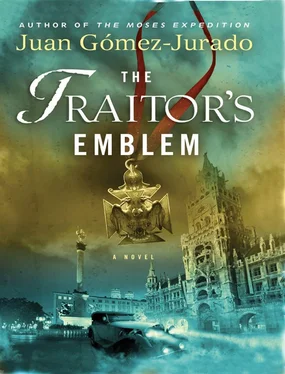Juan Gomez-Jurado - The Traitor's emblem
Здесь есть возможность читать онлайн «Juan Gomez-Jurado - The Traitor's emblem» весь текст электронной книги совершенно бесплатно (целиком полную версию без сокращений). В некоторых случаях можно слушать аудио, скачать через торрент в формате fb2 и присутствует краткое содержание. Жанр: Триллер, на английском языке. Описание произведения, (предисловие) а так же отзывы посетителей доступны на портале библиотеки ЛибКат.
- Название:The Traitor's emblem
- Автор:
- Жанр:
- Год:неизвестен
- ISBN:нет данных
- Рейтинг книги:4 / 5. Голосов: 1
-
Избранное:Добавить в избранное
- Отзывы:
-
Ваша оценка:
- 80
- 1
- 2
- 3
- 4
- 5
The Traitor's emblem: краткое содержание, описание и аннотация
Предлагаем к чтению аннотацию, описание, краткое содержание или предисловие (зависит от того, что написал сам автор книги «The Traitor's emblem»). Если вы не нашли необходимую информацию о книге — напишите в комментариях, мы постараемся отыскать её.
The Traitor's emblem — читать онлайн бесплатно полную книгу (весь текст) целиком
Ниже представлен текст книги, разбитый по страницам. Система сохранения места последней прочитанной страницы, позволяет с удобством читать онлайн бесплатно книгу «The Traitor's emblem», без необходимости каждый раз заново искать на чём Вы остановились. Поставьте закладку, и сможете в любой момент перейти на страницу, на которой закончили чтение.
Интервал:
Закладка:
Suddenly he stopped between two pages of the Allgemeine Zeitung. His heart somersaulted. It was right there: an idea, in a small two-column piece, almost ridiculous beside the large banner headlines announcing endless disasters and the possible collapse of the government. He could have skipped straight over it if he hadn’t been searching for that very thing.
It was crazy.
It was impossible.
But if it works… we’ll be rich.
It would work. Paul was sure of it. The hardest thing would be to convince Herr Ziegler. An old conservative Prussian like him would never accept such a plan, not even in Paul’s wildest dreams. Paul couldn’t even imagine how to suggest it.
So I’d better think fast, he said to himself, biting his lip.
22
It had all started with the assassination of minister Walther Rathenau, a famous Jewish industrialist. The desperation into which Germany sank between 1922 and 1923, when two generations saw their values overturned completely, had begun one morning when three students drew up alongside Rathenau’s car, peppered him with machine gun bullets, and threw a grenade at him. On June 24, 1922, the terrible seed was sewn; more than two decades later, it would result in more than fifty million dead.
Until that day, the Germans had thought that things were already going badly. But from that day onward, with the whole country transformed into a madhouse, all they wanted was to go back to the way things were before. Rathenau had been in charge of the foreign ministry. At that turbulent time, when Germany was in the hands of its creditors, it was a job that was even more important than the presidency of the republic.
The day Rathenau was killed, Paul wondered whether the students had done it because he was Jewish, because he was a politician, or to try to help Germany come to terms with the disaster of Versailles. The impossible reparation the country would have to pay-until 1984!-was plunging the population into destitution, and Rathenau was the last bastion of common sense.
After his death, the country started printing money simply in order to pay their debts. Did those responsible realize that every mark they printed devalued the rest? They probably did, but what else could they have done?
In June 1922, one mark could buy you two cigarettes; two hundred and seventy-two marks equaled one U.S. dollar. By March 1923, on the same day that Paul carelessly put an extra potato in Frau Schmidt’s bag, five thousand marks were needed to buy a cigarette, and twenty thousand to go into a bank and come out with a crisp dollar bill.
Families struggled to keep up as the insanity spiraled. Each Friday, which was payday, the women would be waiting for their husbands at the factory doors. Then, all at once, they’d besiege the shops and grocery stores, they’d flood the Viktualienmarkt on Marienplatz, they’d spend the last pfennig of the salary on absolute essentials. They’d return home laden with food and try to eke it out for the rest of the week. Not a lot of business was done in Germany on the other days of the week. Pockets were empty. And on a Thursday night, a BMW production supervisor had the same purchasing power as an old tramp dragging his stumps through the mud under the bridges of the Isar.
There were many who could not bear it.
Those who were old, who lacked imagination, who took too much for granted, they were the ones who suffered the most. Their minds could not cope with all these changes, with this back-to-front world. Many committed suicide. Others wallowed in their poverty.
Others changed.
Paul was one of those who changed.
After Herr Graf dismissed him, Paul had a terrible month. He barely had time to overcome his anger at Jurgen’s attack and the revelation of Alys’s fate, or to devote more than a fleeting thought to the mystery of his father’s death. Yet again, the need for survival was so acute that he had to suppress his own emotions. But the burning pain often flared at night, populating his dreams with ghosts. He often could not sleep, and on many mornings, as he tramped through the Munich streets in shabby, snow-filled shoes, he thought about dying.
Sometimes, when he returned to the boardinghouse with no job, he’d catch himself looking at the Isar from Ludwigsbrucke, his eyes empty. He wanted to throw himself into the icy waters, to allow the current to drag his body down to the Danube, and from there to the sea. That fantastical expanse of water, which he’d never seen, but where he’d always thought his father had met his end.
On these occasions he had to find a reason not to climb up on the wall and jump. The image of his mother, waiting for him every night at the boardinghouse, and the certainty that she wouldn’t survive without him prevented him from extinguishing the fire in his belly once and for all. At other times it was the fire itself, and the reasons for it, that held him back.
Until at last there was a glimmer of hope. Although it resulted through death.
One morning a deliveryman collapsed at Paul’s feet in the middle of the road. The empty wheelbarrow he’d been pushing tipped over onto its side. The wheels were still spinning as Paul crouched down and tried to help the man up, but he couldn’t move. He gasped desperately for air, and his eyes were glassy. Another passerby approached. He was wearing dark clothes and carried a leather case.
“Make way! I’m a doctor!”
For a while the doctor tried to revive the fallen man, but with no success. Finally he stood up, shaking his head.
“A heart attack or an embolism. Hard to believe, in someone so young.”
Paul was looking at the dead man’s face. He must have been only nineteen years old, maybe less.
Like me, thought Paul.
“Doctor, will you take care of the body?”
“I can’t, we have to wait for the police.”
When the officers arrived, Paul patiently described what had happened. The doctor corroborated his report.
“Would you mind if I took the wheelbarrow back to its owner?”
The officer glanced at the empty wheelbarrow, then looked at Paul long and hard. He didn’t like the idea of dragging the cart back to the police station.
“What’s your name, pal?”
“Paul Reiner.”
“And why should I trust you, Paul Reiner?”
“Because I’ve got more to gain by taking this to the owner of the shop than if I try to sell these bits of badly nailed wood on the black market,” said Paul with absolute honesty.
“Very well. Tell him to get in touch with the police station. We’ll need to know the next of kin. If he hasn’t called on us in three hours, you’ll answer to me.”
The officer gave him a bill they’d found, the neat handwriting indicating the address of the grocer’s-on a street near the Isartor-with a list of the last things the dead boy had transported:? kilo of coffee 3 kilos of potatoes 1 bag of lemons 1 can of Kruntz soup? kilo of salt 2 bottles of corn spirit
When Paul arrived at the shop with the wheelbarrow and asked for the dead boy’s job, Herr Ziegler flashed him a distrustful look not unlike the one he gave Paul six months later when the young man explained his plan to save them from ruin.
“We should transform the shop into a bank.”
The shopkeeper dropped the jam jar he was cleaning, and it would have shattered on the floor if Paul hadn’t managed to catch it midflight.
“What are you talking about? Have you been drinking?” he said, staring at the huge circles under the boy’s eyes.
“No, sir,” said Paul, who had been up all night turning the plan around and around in his mind. He’d left his room at dawn and taken up position at the door of the town hall half an hour before it opened. Then he’d run from window to window collecting information about permits, taxes, and conditions. He had returned with a thick cardboard file. “I know it might seem mad, but it’s not. Right now, money has no value. Wages go up daily and we have to calculate our prices every morning.”
Читать дальшеИнтервал:
Закладка:
Похожие книги на «The Traitor's emblem»
Представляем Вашему вниманию похожие книги на «The Traitor's emblem» списком для выбора. Мы отобрали схожую по названию и смыслу литературу в надежде предоставить читателям больше вариантов отыскать новые, интересные, ещё непрочитанные произведения.
Обсуждение, отзывы о книге «The Traitor's emblem» и просто собственные мнения читателей. Оставьте ваши комментарии, напишите, что Вы думаете о произведении, его смысле или главных героях. Укажите что конкретно понравилось, а что нет, и почему Вы так считаете.












